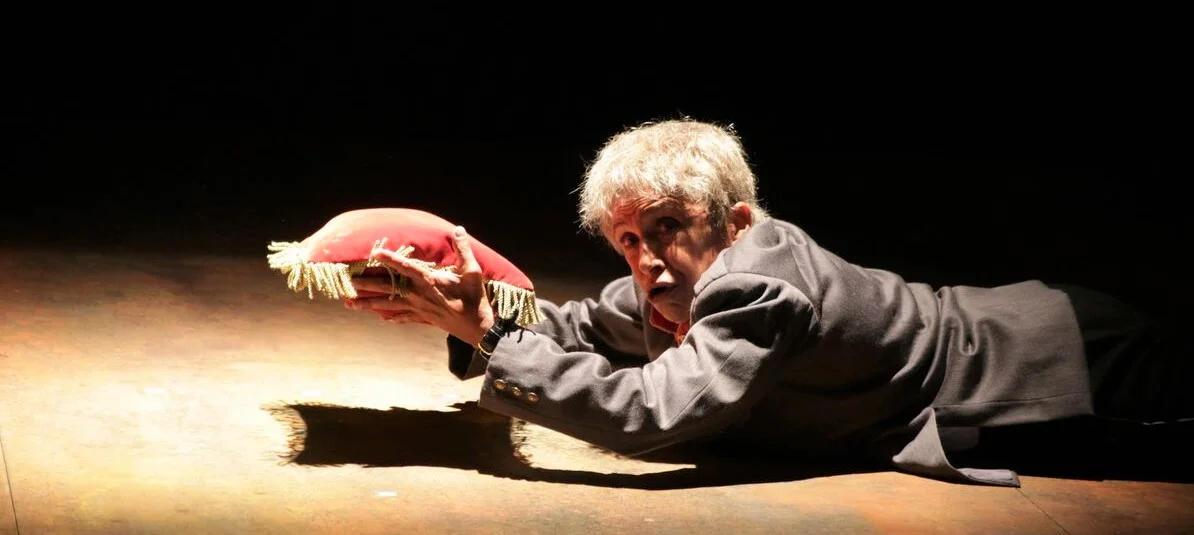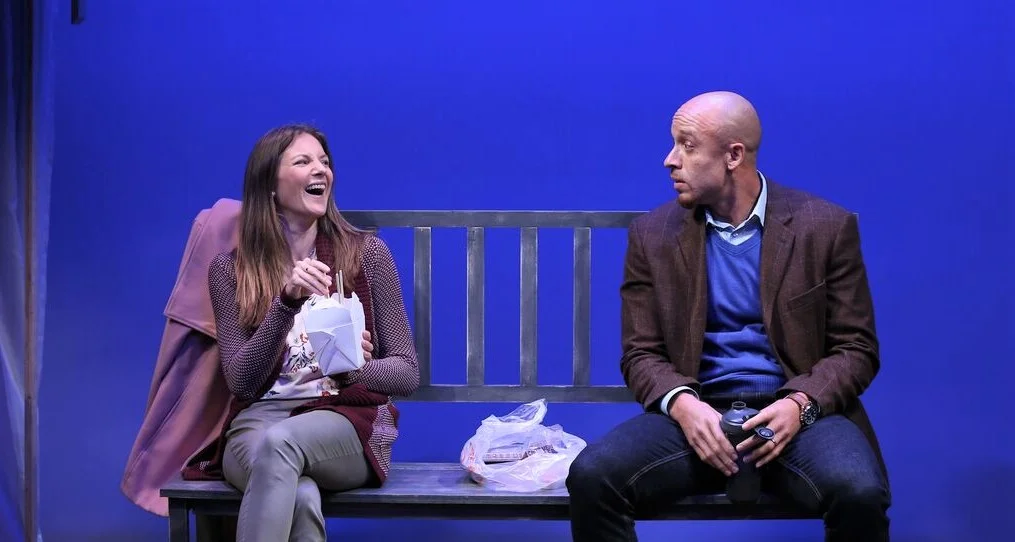Bernard Pomerance, who died last year at age 76, is best known for having written that brutal little lesson in humanity, The Elephant Man. That play’s best line, “We have polished him like a mirror, and shout hallelujah when he reflects us to the inch,” nicely encapsulates the playwright’s concerns over the societal tendency to perform acts of charity for the sake of the giver. But, as is discovered in the wandering world premiere of Spin Off, which was drafted in 2003 and revised in 2006, Pomerance’s thought processes were not always so tidy.
The True
To anyone who grew up in the Albany area before cable television (or, as I did, in western Massachusetts, served only by Albany stations), the name Erastus Corning was inescapable. For 35 years he was the Democratic mayor of the city, and nightly broadcasts featured him prominently. Sharr White’s marvelous new play The True makes Corning (Michael McKean) a central character in a story of what political parties and machine politics once were and, by contrast, what they have become. It has scope, intelligence and terrific writing.
The Revolving Cycles Truly and Steadily Roll’d
A teenage boy goes missing, and his foster sister embarks on an urban odyssey to track him down in the Playwrights Realm’s brazen production of The Revolving Cycles Truly and Steadily Roll'd. Early-career dramatist Jonathan Payne unleashes a Pandora’s box of theatrical devices, including symbolically named characters, direct audience interaction, screen projections, a live-streaming cellphone, and actors not only breaking the fourth wall but breaking character as well. Veteran off-Broadway director Awoye Timpo molds it all into a bracing panorama of societal failures amid institutional racism. That is, until the final scene when, with the play’s momentum waning, she and Payne risk one last gambit that unfortunately swallows up all that came before it.
James and Jamesy in the Dark
James and Jamesy in the Dark is an extraordinary piece of theater that fits no mold but its own. It draws on many sources—or pays homage to them—but it is a unique, thought-provoking delight. Two gifted physical performers (in whiteface and dressed top-to-toe in gray outfits, including gloves) embody the title characters. Eventually, the audience comes to recognize the taller one as Aaron Malkin’s more phlegmatic James and the shorter, more emotionally fragile one as Alastair Knowles’s Jamesy.
The Emperor
The Emperor, based on a book of interviews with elderly government employees in the court of Emperor Haile Selassie of Ethiopia, is every bit as intellectual a docudrama as it sounds, mostly lacking emotional engagement. It’s more like history presented with interspersed activity as window dressing. Those who attend are likely to do so because of actress Kathryn Hunter’s reputation rather than a burning desire to hear about Selassie, who died in 1975.
The Naturalists
The three principal characters of Jaki McCarrick’s drama The Naturalists are refugees from a society that, in their view, damages the earth and is toxic to the human heart. The time is 2010; the place, the Republic of Ireland’s Border Region. Brothers Francis and Billy Sloane (John Keating and Tim Ruddy) have settled into middle age as small-time farmers, accustomed to being alone with each other and the glorious landscape around them.
Heartbreak House
The Gingold Group in New York thrives on the plays of George Bernard Shaw. Each month, artistic director David Staller assembles a cast for readings of them, but far too seldom is a Shaw work fully staged in New York. As Staller’s production of Heartbreak House shows, Shaw is still timely, almost uncannily so. Set during World War I, the play is an examination of the British nation; its characters encompass rich and poor, young and old, gentry and businessmen and clergy. In the view of the shrewd old socialist, it is, in the words of heroine Ellie Dunn, a “house without foundation—I call it Heartbreak House.”
Hurricane Party
A dangerous storm, Evelyn, is bearing down on the characters in David Thigpen’s Hurricane Party, but the more immediate threat to their existence arises from their own behavior. Opening on a steamy sex scene, Maria Dizzia’s production is suffused with an eroticism often associated with a hot climate, akin to that of the film Body Heat. The characters in the scene, Dana and Macon (Kevin Kane and Sayra Player, respectively), are entering middle age and at a crossroads. Each is married to another person, and, in Macon’s case, it’s Todd, Dana’s best friend. She and Dana have been conducting an affair for “two years and three months,” and now he plans to spirit her away within the week for a future together.
Scraps
Scraps, a new work by award-winning playwright Geraldine Inoa, begins like an ancient Greek play would—with a prologue that sets the stage for the drama. In Scraps, however, a character, Jean-Baptiste (Roland Lane) raps the prologue from the stoop of an apartment building in Bedford-Stuyvesant, Brooklyn. “Allow me to be your Greek chorus,” he says to the audience, and his rhymes paint a portrait of the neighborhood in 2014, where the injustices of police violence are keenly felt. Indeed, a police officer has just shot neighborhood local Forest Winthrop, who was on the way home with diapers for his son.
Days to Come
Lillian Hellman left the theater a couple of decades before she left this world. In her remaining years, she published memoirs depicting herself as a conscience-driven adversary of misogynists, Nazis, and the House Un-American Activities Committee. When public intellectuals such as Mary McCarthy, Norman Podhoretz, and Diana Trilling took issue with what she wrote, Hellman let rip with insults and invective. By the time she died in 1984, Hellman’s name was associated more with public feuds than with the literate Broadway plays that had made her famous.
Henry VI
Three productions of Henry VI, William Shakespeare’s seldom staged trilogy, have cropped up Off-Off Broadway since January. The latest, by the ambitious National Asian American Theatre Company (NAATCO), brings epic pageantry and violence to the intimate Mezzanine space at the A.R.T./New York complex on West 53rd Street.
Intrusion
Discussing rape is not easy in any context. It has scarred our collective humanity; in many societies it is still a taboo subject; it is almost too offensive to broach. Intrusion, a one-woman show written and performed by writer/actor/activist Qurrat Ann Kadwani and directed by Constance Hester, finds a way.
Wars of the Roses: Henry VI & Richard III
Two years ago New York theatergoers had the opportunity to see Kings of War, Ivo Van Hove’s compilation of five Shakespearean history plays. Tracing the royal lineage of Henry V through Henry VI and ending with Richard III (with a few additional coronations in between), Van Hove’s four-hour-plus production was a grand, sweeping, and technologically sophisticated epic. Working on a much smaller scale, director, adaptor, and actor Austin Pendleton has created his own synthesis of the battles between the Houses of Lancaster and York for Wars of the Roses: Henry VI & Richard III, which is currently playing at the 124 Bank Street Theatre. A mashup of Shakespeare’s Henry VI, Part 3 and Richard III and running a mere three hours, Pendleton’s adaptation offers its fair share of both theatrical rewards and pitfalls.
Summer Shorts 2018 (Series A)
A Pirandellian lark and two plays with feminist concerns constitute Summer Shorts (Series A), the invaluable annual presentation of one-acts at 59E59th Street Theaters by Throughline Artists.
Summer Shorts 2018 (Series B)
The inherent tensions of sibling rivalry, a father and son reunion and a budding office romance drive the three 30-minute plays that make up the uneven Series B of this year’s Summer Shorts festival, presented by Throughline Artists. And, perhaps unintentionally, this showcase of new American one-acts is also a lesson in how the invention of the smartphone has changed the craft of playwriting.
The Possibilities/The After-Dinner Joke
In what has become a rite of summer in New York, the Potomac Theatre Project (PTP) has taken up residence at the Atlantic Stage 2. The company’s first offering is a double bill featuring Howard Barker’s The Possibilities, directed by Richard Ramagnoli, and Caryl Churchill’s The After-Dinner Joke, directed by Cheryl Faraone. Although stylistically quite different, the plays generally fit together well in their emotionally dizzying and intellectually disorienting exploration of power and politics.
The Saintliness of Margery Kempe
Can a sinner become a saint? That is the question John Wulp explores in The Saintliness of Margery Kempe, first produced in 1958 at the Poet’s Theatre in Cambridge, Mass., and last seen in an Off-Broadway production the following year. The story is loosely based on the real life of Margery Kempe, a woman who lived in the 14th century and wrote the first known autobiography in Western literature. At the beginning of the play, Margery (the wonderful Andrus Nichols, who brings an energetic intensity to the role) declares, “Morality, damn all morality, damn, damn, damn.” A feminist long before the feminist movement, she seeks to shrug off the assumptions that inform her role as mother, housewife and religious community member. She hates it all and leaves home.
Skintight
Jodi (Idina Menzel), the fortysomething central character in Joshua Harmon’s attention-grabbing new drama, Skintight, is having a bad time. She has arrived unannounced at her father’s Greenwich Village townhouse to help celebrate his 70th birthday, even though she has been warned not to by her dad. But she’s determined to connect with those who love her in her time of trial: in Los Angeles she has just attended the wedding of her ex-husband to a perky young 25-year-old.
Log Cabin
Arriving during gay pride month, Jordan Harrison’s new play explores currents of non-heterosexual identity in a nearly comprehensive way. Its characters cover the waterfront in terms of gender fluidity, with side trips to racial and class identity. Allen Moyer’s primary set is an apartment with ceiling-high bookcases and comfortable modern furniture. In spite of the elegance, however, Harrison’s characters might as well be living in the titular log cabin. They are sexual pioneers lost in a wilderness of fluctuating gender identity rather than ferocious animals and untamed nature.
All I Want Is One Night
Time has not been kind to Suzy Solidor, the Parisian nightclub sensation of the 1930s. Solidor earned a reputation as “the most-painted woman in the world,” and her image was captured by some of the greatest artists of the 20th century, including Tamara de Lempicka, Pablo Picasso, Man Ray, and dozens of others. Known primarily for her erotic songs about lesbian desire, Solidor is all but forgotten today, but the immensely gifted singer and actress Jessica Walker may just rescue her from the footnotes of entertainment history. Walker’s new work, All I Want Is One Night, which is part of the Brits Off Broadway series at 59E59 Theaters, offers compelling reason to become reacquainted (or, as the case may be, acquainted) with the cross-dressing French cabaret singer.
























